Return on the webinar: “Contribution of genomic surveillance in the management of epidemics in the DRC from 2018 to the present day”
Return on the webinar: “Contribution of genomic surveillance in the management of epidemics in the DRC from 2018 to the present day”
Dr. Amuri Aziza Adrienne, Medical Biologist, and Dr. Kinganda Lusamaki Eddy, Medical Biologist, from the Laboratory of Pathogen Genomics of the Institut National de Recherche Biomédicale (INRB), Kinshasa, Democratic Republic of Congo, presented the contribution of genomic surveillance in the management of epidemics in the Democratic Republic of Congo from 2018 to today.
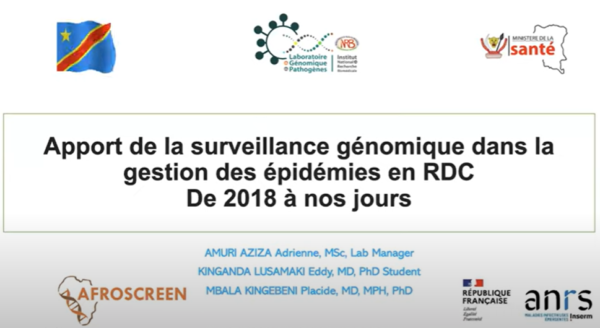
Given its large size, the DRC has had to deal with several epidemics, sometimes concurrently since 2018: Ebola, Covid-19, Monkeypox, plague, but also measles, yellow fever, among others.
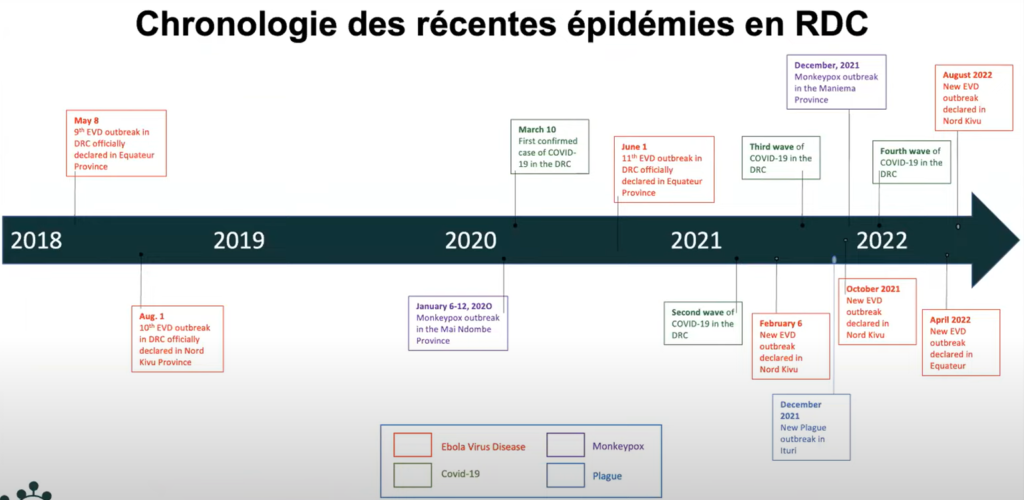
Dr. Amuri Aziza told us about the installation of the first sequencing platform in Kinshasa in 2018, during the 9th Ebola epidemic and stressed the importance of being able to Deploying mobile laboratories or installing sequencing platforms in different provinces to strengthen the DRC’s capacity in terms of epidemic preparedness. Today, two pathogen genomics laboratories are operational in DRC: in Kinshasa and in North Kivu. And the INRB laboratory was rehabilitated with funding and visited by President Macron in April 2023. A new implementation is underway in Lubumbashi in the south of the country. The objective is to extend and distribute the presence of these laboratories in strategic areas of the DRC in order to be able to sequence locally during epidemics.
At INRB, sequencing is routinely performed for 6 pathogens: polio, measles, Ebola, Monkeypox, Covid-19, plague, and activities will soon be extended to plasmodium, HIV and cholera.
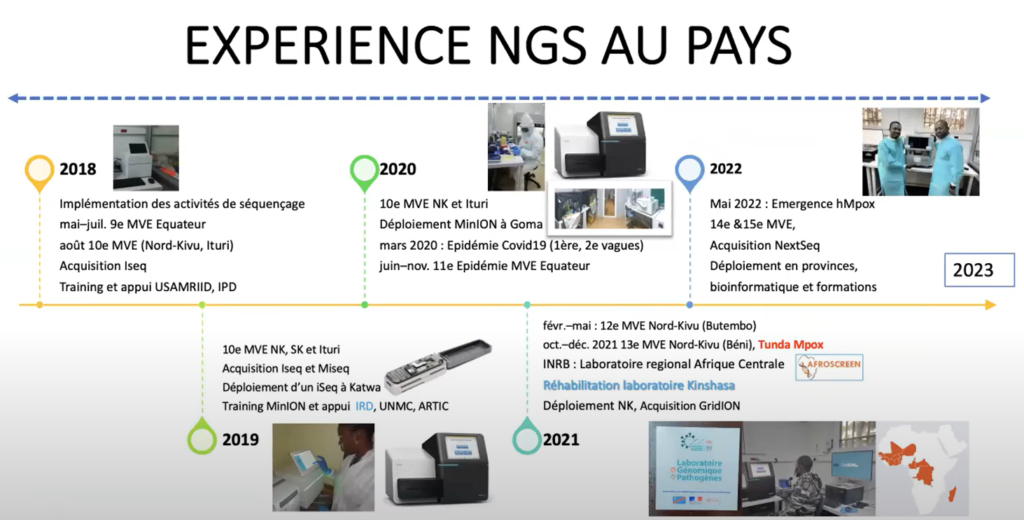
Dr. Amuri Aziza presented various examples demonstrating the importance of sequencing, particularly in the response to Ebola outbreaks that have occurred since 2018, as well as other epidemics.
Indeed, the 9th Ebola outbreak in Equateur province in 2018 ended when the 10th, the largest to date in DRC, was declared in North Kivu province. Sequencing of the samples confirmed that these were two different outbreaks. In addition, the sequencing work carried out for two years in North Kivu, in a context of war and insecurity, has led to various publications (“Integration of genomic sequencing into the response to the Ebola virus outbreak in Nord Kivu, Democratic Republic of the Congo,” Nature Medicine and “Ebola Virus Transmission Initiated by Relapse of Systemic Ebola Virus Disease” The New England Journal of Medicine).
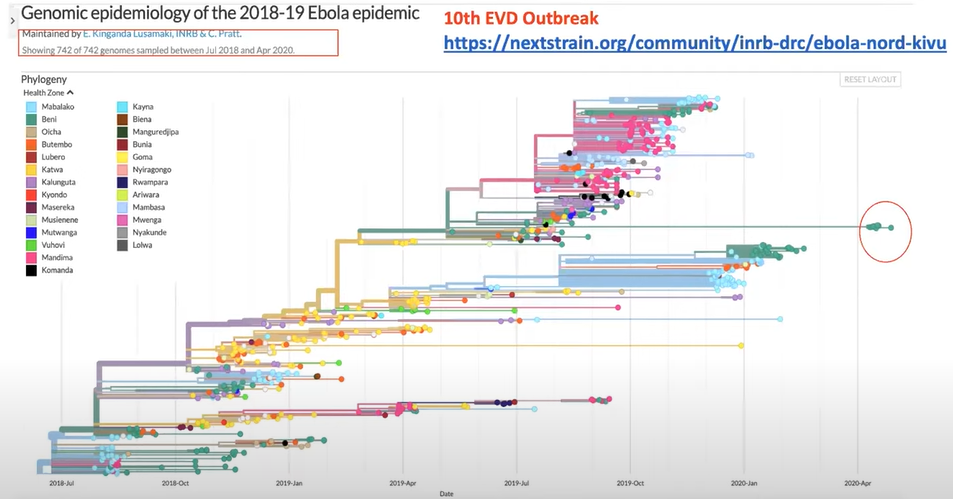
In addition, Dr. Amuri Aziza insisted on monitoring the evolution of the Covid-19 epidemic in the DRC, which is currently in its 6th wave, with a high number of cases.
Regarding Monkeypox, since 2020, notifications are appearing in new provinces that were not previously affected. Today, 20 of the 26 provinces in the DRC have positive cases of Monkeypox, and the production of large numbers of samples raises the issue of storage.
In a second part of the webinar, Dr. Kinganda Lusamaki Eddy presented the creation of a biobank at INRBcapable of storing highly pathogenic organisms, guaranteeing biosafety and biosecurity with the storage of 400,000 samples to date (Ebola, SARS-CoV-2, samples derived from wildlife and human sentinel surveillance, etc.)
Dr. Kinganda Lusamaki Eddy emphasized the importance of different factors for the functioning of the biobank:
- A system to maintain the supply of electrical energy
- A system to monitor the temperature of freezers
- A sample management system
Finally, Dr. Kinganda Lusamaki Eddy emphasized the importance of reagent supply, maintenance, repair and replacement of equipment, training of teams, as well as development and collaboration with other scientific teams and consortia around the world in order to continue epidemic preparedness.
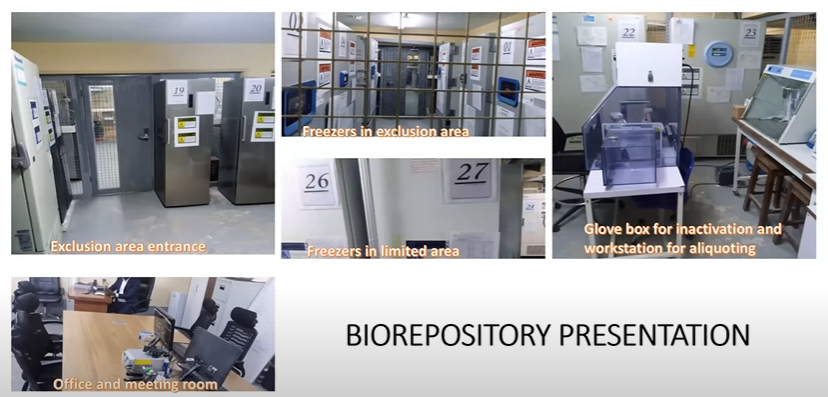
To learn more, watch the entire webinar: https: //www.youtube.com/watch?v=nuLbi-IwPTs
Given its large size, the DRC has had to deal with several epidemics, sometimes concurrently since 2018: Ebola, Covid-19, Monkeypox, plague, but also measles, yellow fever, among others.

Dr. Amuri Aziza told us about the installation of the first sequencing platform in Kinshasa in 2018, during the 9th Ebola epidemic and stressed the importance of being able to Deploying mobile laboratories or installing sequencing platforms in different provinces to strengthen the DRC’s capacity in terms of epidemic preparedness. Today, two pathogen genomics laboratories are operational in DRC: in Kinshasa and in North Kivu. And the INRB laboratory was rehabilitated with funding and visited by President Macron in April 2023. A new implementation is underway in Lubumbashi in the south of the country. The objective is to extend and distribute the presence of these laboratories in strategic areas of the DRC in order to be able to sequence locally during epidemics.
At INRB, sequencing is routinely performed for 6 pathogens: polio, measles, Ebola, Monkeypox, Covid-19, plague, and activities will soon be extended to plasmodium, HIV and cholera.

Dr. Amuri Aziza presented various examples demonstrating the importance of sequencing, particularly in the response to Ebola outbreaks that have occurred since 2018, as well as other epidemics.
Indeed, the 9th Ebola outbreak in Equateur province in 2018 ended when the 10th, the largest to date in DRC, was declared in North Kivu province. Sequencing of the samples confirmed that these were two different outbreaks. In addition, the sequencing work carried out for two years in North Kivu, in a context of war and insecurity, has led to various publications (“Integration of genomic sequencing into the response to the Ebola virus outbreak in Nord Kivu, Democratic Republic of the Congo,” Nature Medicine and “Ebola Virus Transmission Initiated by Relapse of Systemic Ebola Virus Disease” The New England Journal of Medicine).

In addition, Dr. Amuri Aziza insisted on monitoring the evolution of the Covid-19 epidemic in the DRC, which is currently in its 6th wave, with a high number of cases.
Regarding Monkeypox, since 2020, notifications are appearing in new provinces that were not previously affected. Today, 20 of the 26 provinces in the DRC have positive cases of Monkeypox, and the production of large numbers of samples raises the issue of storage.
In a second part of the webinar, Dr. Kinganda Lusamaki Eddy presented the creation of a biobank at INRBcapable of storing highly pathogenic organisms, guaranteeing biosafety and biosecurity with the storage of 400,000 samples to date (Ebola, SARS-CoV-2, samples derived from wildlife and human sentinel surveillance, etc.)
Dr. Kinganda Lusamaki Eddy emphasized the importance of different factors for the functioning of the biobank:
- A system to maintain the supply of electrical energy
- A system to monitor the temperature of freezers
- A sample management system
Finally, Dr. Kinganda Lusamaki Eddy emphasized the importance of reagent supply, maintenance, repair and replacement of equipment, training of teams, as well as development and collaboration with other scientific teams and consortia around the world in order to continue epidemic preparedness.

To learn more, watch the entire webinar: https: //www.youtube.com/watch?v=nuLbi-IwPTs